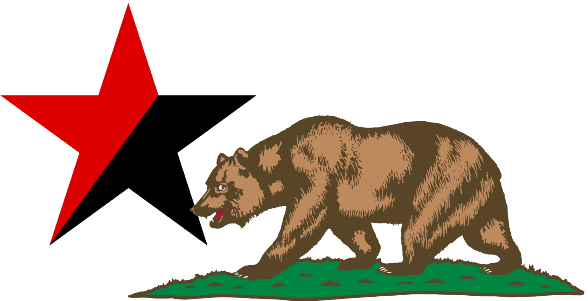
Markets and the State
Capitalism and Marxism are the twin children of Statism – neither can survive without the authoritarian State and neither can free us.
For part 1 of this series, check out What is the State?
Many people are under the false impression that markets = capitalism. Nothing could be further from the truth. Every economic system – from tribal systems to stateless village-based agrarian systems to feudalism to capitalism all the way to stalinist command economies – has a marketplace. Wherever people have things they want to exchange and scarcity exists, the market exists along with it.
In point of fact, while Capitalist theory worships the free market, in practice capitalism and free markets are mutually exclusive – you can have one but not the other.
So what is Capitalism then? The definition is surprisingly controversial, but all Capitalist systems have included the following:
- Private ownership of land and other primary goods (the materials used to create the means of production)
- Private ownership of businesses and the means of production by individuals and corporations (as opposed to worker ownership, community ownership, or State ownership).
- A State that enforces that private / minority ownership system and maintains class divisions between the people who own everything and the rest of the population.
- A wage system in which the majority sell their labor to the people who own the land and means of production in return for wages equivalent to a portion of the wealth they create (the difference between the wealth workers create and the pay they receive is the capitalist’s profit margin)
Most definitions of Capitalism stop there because both Marxists who advocate planed economies and Capitalists who want the broadest definition possible have an interest in defining Markets and Capitalism as essentially synonymous. However, an honest historical analysis would add two additional points:
- The existence of Corporations (fictitious legal “persons” that can own land and businesses and that the State grants special privileges such as limitations on liability)
- A speculative stock market in which people can purchase and trade “shares” of those corporations in the hope of a future eventual return on investment
In point of fact, Corporations and States originate at the exact same moment in history and it is the legal fiction of the corporation – a form of collective ownership in which the owning class is able to reap profit from the actions of a business without accepting any liability for the harms caused by that business – that allowed the rise of Capitalism; and with it Imperialism, and the State.
Capitalism isn’t just a market (a currency based exchange of goods and services). It is a layer of abstraction in which a minority can limit their liability, speculate, and trade rights to the future value created by people who produce goods and services; without actually creating any goods or services themselves.
There are many other kinds of market-based economies. In fact, all economies are market economies. Even Communism.
In what marxists call ‘primitive communism’ the market operates on social currency where people help each other voluntarily knowing that they will be helped in turn. Unlike capitalism, people who are disabled will usually be well cared for, but people who have the capacity to contribute and don’t quickly find that others are no longer willing to share and are forced to leave. The threat of exile in a tribal society is a serious one since rugged individualism is largely a myth – unless the exile can find a new tribe they will likely die. That’s a potent incentive to pull your own weight.
At the other end of the spectrum, in Stalinist command economies like the USSR, the market was nominally illegal but still existed. Secondary markets or “black markets” were an absolutely critical part of the USSR’s economy and the system would have collapsed much sooner without them. And, of course, China’s version of socialism openly embraces a capitalist market while pretending it is socialist because the State controls the central bank. In practice, Statists attempts at creating Communism have always ended up having far more in common with Capitalism than they did with any of the “primitive communist” societies Marx cited as inspiration.
Capitalism and the State evolved together as mutually reinforcing systems. They are inseparable. Marxism’s mistake is believing that it’s possible to make half a revolution and only abolish one of them. At most, Marxism replaces the bourgeoisie with bureaucrats while leaving the working class exploited and at the mercy of the State. In Marxism, the State replaces capitalist speculators and controls capital flows to businesses. In all other respects the system is identical – there is still a fundamental divide between the people whose labor creates value and the people who make the decisions about how that wealth will be distributed. Even in a perfect marxist State with no corruption (something that has never existed anywhere), it would be impossible to ever get from that to Marx’s ideal of a free stateless communism where the workers run things directly. A marxist State is no more likely to abolish itself than a Capitalist one.
Capitalist markets are marginally more “free” than their “communist” cousins, but they are similarly shaped by the State. The right-libertarian ideal of perfect capitalist free market, freed from the constraints of State regulation is a pipe dream. Without at least basic regulation, capitalism quickly creates monopolies, and a monopoly is nothing but a privately owned command economy. And without the State and its armies and police to keep working class people subservient, the wealth of the world would have been redistributed a long time ago. Without the State, capitalism cannot exist.
Every inch of privately held land on this planet was at one time collectively owned. And every inch of it was stolen by elites through violence – from the rise of the first empires that crushed the relatively egalitarian tribal societies they conquered through to feudalism and the enclosure movement that heralded Capitalism’s birth. Every step along the way has seen more and more of what used to be collectively owned wealth taken and privatized. Capitalism is the end result of this process and is only possible because of pre-existing inequalities. Of course, stolen property remains stolen – no matter how many hands it passes through. All of that wealth still belongs to all of us. Maintaining this theft and preventing the general population from reclaiming our birthright is one of the primary responsibilities of the State. As Madison put it at the American constitutional convention, the role of government is to “protect property from the majority.”
By maintaining that unequal distribution of wealth, capitalists are able to use the threat of starvation to force other people to work for them. It’s nothing so crude as a gun to the head these days, but the tent cities full of homeless people in every major city make the point well enough. Capitalism requires poverty, the threat of destitution lubricates the gears of the machine.
Once workers are enmeshed in the wage system, capitalism compounds its crimes through the systematic theft of surplus value – the difference between the value of the things labor creates and the value paid to the workers in wages. Of course early capitalists often didn’t bother with wages at all, they used chattel slavery to steal human beings and then steal everything from those human beings. All the wealth created by enslaved people and through wage slavery remains the rightful property of the laborers who created it and their descendants – all of us. It, along with the earth itself, are the common heritage of humanity.
And all of that is made possible because the State ensures that markets are never free in any meaningful sense. This is necessary for capitalism to exist.
In other words, Capitalism is only possible because the State enforces the illegitimate inequalities of private ownership, which are themselves the result of centuries of systematic violence and exploitation. Without that system of organized violence to prevent the working class from reclaiming everything that has been stolen from us, Capitalism is impossible.
And so we see that the capitalist “free” market is anything but free.
So what would a truly free market – one without state-backed private ownership of land or primary goods – look like? For that, let’s take a look at Mutualism.

1 thought on “Markets and the State”
Comments are closed.